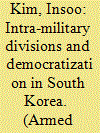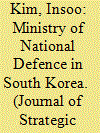| Srl | Item |
| 1 |
ID:
136114


|
|
|
|
|
| Summary/Abstract |
In August 2012, Armed Forces & Society published an article by Insoo Kim, “Intra-military Divisions and Democratization in South Korea.” Uk Heo and Seongyi Yun refuted Kim's argument in their Disputatio Sine Fine response, “Another View on the Relationship between Democratization and Intra-Military Division in South Korea,“ published in April 2013. In the article, Heo and Yun argued that there was no clear sign of schism in the South Korea military and economic development substantially produced favorable condition for democratization in South Korea. Kim, by contrast, maintains that that the effect of intra-military division on political transition should be incorporated into the explanation of democratization in South Korea because Heo and Yun do not justify their claim that there was no clear evidence of schism in the South Korean military.
|
|
|
|
|
|
|
|
|
|
|
|
|
|
|
|
| 2 |
ID:
137624


|
|
|
|
|
| Summary/Abstract |
This study examines how collective identity based around military school ties influences an individual officer’s achievement in the military. The central premise of this study is that if collective identity can form the basis for fragmented social networks in the South Korean officer corps, it can result in different opportunities for members within different networks. The results presented here demonstrate that collective identities are important explanatory factors to account for this exchange of social resources. All else being equal, the exchange of instrumental and material resources is more likely between military officers who graduated from the same civilian or military school.
|
|
|
|
|
|
|
|
|
|
|
|
|
|
|
|
| 3 |
ID:
109216


|
|
|
|
|
| Publication |
2011.
|
| Summary/Abstract |
Contrary to the traditional thinking in political liberalism that intertwined economic interests would prevent conflict, South Korea's unilateral engagement policy with North Korea has failed to ease military confrontation, as North Korean boats have continued to cross the Northern Limit Line (NLL). In the economic crisis of the 1990s, North Korea was largely dependent on the fishery industry in order to earn foreign currency. North Korea's outdated fishing boats could not travel beyond its inland sea, but were pressured to fulfill their quota of marine product catches. As a consequence, North Korea's outdated fishing boats were likely to cross the NLL in the hope of exploiting neighboring waters near the NLL. This paper demonstrates that North Korea's NLL violations rise and fall based not on South Korea's engagement or containment policy toward North Korea, but rather on North Korea's need to catch more marine products. The views expressed here are the opinions of the authors and as such do not represent the official position of the South Korean government.
|
|
|
|
|
|
|
|
|
|
|
|
|
|
|
|
| 4 |
ID:
109757


|
|
|
| 5 |
ID:
156476


|
|
|
|
|
| Summary/Abstract |
This study aims to identify the inter-Korean communicative belief and empirically
test whether it can interpret North Korea’s intentions. This research assumes that
North Korea uses verbal, vocal, and visual codes in its TV message format when
it intends to confront South Korea, and inter-Korean relations worsen when North
Korea uses such codes in its TV messages. Next, this study constructs the ideal type
of North Korea’s message format, which consists of intellectually accessible verbal,
vocal, and visual codes that are likely to represent North Korea’s hostility toward
South Korea. This study analyzes 321 official statements and 65 video clips that
North Korea issued to South Korea from 2011–2015 and examines the statistical
regularity between North Korea’s intentions interpreted on the basis of message
format and observed changes in inter-Korean relations. The results show that interKorean
relations grew statistically significantly worse when a particular female
announcer and more bellicose images appeared.
|
|
|
|
|
|
|
|
|
|
|
|
|
|
|
|
| 6 |
ID:
124065


|
|
|
|
|
| Publication |
2013.
|
| Summary/Abstract |
This paper investigates how a highly politicized system of military reshuffling under the authoritarian military regime contributed to the transition to democracy in South Korea in the 1980s. Through an analysis of individual data on 2,666 Korean Military Academy (KMA) graduates, this study shows that promotion policies favored a small group of KMA graduates, called the Hana faction, who were preferentially treated in military promotions and recruited into the military leadership. These biased promotion procedures undermined the cohesion within the military as the marginalized non-Hana faction graduates became increasingly resistant to the subordination of their Hana faction superiors. This disintegration of military cohesion ultimately reduced the regime's capacity to block the transition to democracy.
|
|
|
|
|
|
|
|
|
|
|
|
|
|
|
|
| 7 |
ID:
188247


|
|
|
|
|
| Summary/Abstract |
South Korea’s transition from military-controlled authoritarianism to consolidated civilian-dominated democracy is widely considered a success story. However, civilians’ roles within the MND remain severely limited due to the institutional design of the MND. A decentralised structure emerged in the MND, delegating policy decision-making in critical areas to professional soldiers. Data analysis on 1,060 employees in 21 MND departments shows a clear cut between the military domain and the civilian domain within the MND, which enabled the military to thwart 30 years of civilian efforts to reform the military structure without challenging the principle of civilian supremacy.
|
|
|
|
|
|
|
|
|
|
|
|
|
|
|
|
| 8 |
ID:
111529


|
|
|
| 9 |
ID:
193786


|
|
|